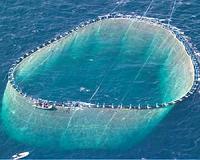| . |  |
. |
Paris (AFP) Nov 18, 2010 A meeting on the fate of the Atlantic bluefin tuna got into its stride on Thursday as Europe mulled a call for a modest cut in catches and Japan said it would propose a fishing ban on nations that cheat. At stake is the viability of billion-dollar fishery for the open-water predator and perhaps even the species' long-term survival, say conservationists. Industrial-scale fishing using huge trap-nets during spawning season has drastically reduced stocks in the Mediterranean over the last three decades. Nearly 80 percent of each year's catch is shipped to Japan, where it is a hallowed part of the national diet, eaten raw as gourmet sushi and sashimi. The 48-member International Commission for the Conservation of Atlantic Tunas (ICCAT), meeting in Paris until November 27, sets the rules and quotas for Atlantic fisheries and monitors compliance. European Union (EU) nations, overcoming internal divisions, agreed late Wednesday to push for a "stable or partially reduced quota". European fisheries commissioner Maria Damanaki, backed in particular by Britain, called last month for slashing yearly quotas to 6,000 tonnes. This is less than half of the 13,500 tonnes extracted from the eastern Atlantic and Mediterranean in 2010. Fishing industry countries led by France -- including Spain, Italy and Malta -- had called for rolling over the current quotas for at least another year. Eventually, though, all 27 member nations agreed on a proposal to "negotiate the bluefin tuna quota between its current level of 13,500 tonnes and a partial reduction", a European diplomat told AFP. Another diplomat said the EU 27 were ready to accept a reduction of 2,000 tonnes. Japan, meanwhile, said it would table a proposal by which countries that cheat on their quotas would be banned from fishing the following year unless they improved monitoring and enforcement measures, the daily Asahi Shimbun reported. "Japan will take leadership in the meeting to ensure the recovery of the stock," Masanori Miyahara, the head of the Japanese delegation, told NHK television in Paris. The United States has in the past pushed for "zero" quotas, but is under pressure from its own domestic industry, centered in Massachusetts, to ease up on restrictions to boost employment. Going into the meeting, ICCAT Chairman Fabio Hazin said that a proposal favoured by four major green groups to suspend industrial fishing in the Mediterranean in favour of more traditional methods was under consideration. "That is a realistic scenario," he said. "One of the things being discussed is the possible suspension of purse-seine fishing and the caging activities." ICCAT scientists are cautious about quota numbers, saying that they could be skewed by high uncertainty about fish populations and the true tonnage of catches. A single Atlantic bluefin tuna can fetch more than 100,000 dollars in wholesale markets in Japan. There, the fish is known as "kuro maguro" (black tuna) and prized by sushi connoisseurs as the "black diamond" because of its scarcity. Bluefin make up less than one percent of the global tuna catch, which includes five species.
Share This Article With Planet Earth
Related Links Water News - Science, Technology and Politics
 Widely Adopted Indicator Of Fisheries Health Questioned
Widely Adopted Indicator Of Fisheries Health QuestionedWashington DC (SPX) Nov 18, 2010 The most widely adopted measure for assessing the state of the world's oceans and fisheries led to inaccurate conclusions in nearly half the ecosystems where it was applied. The new analysis was performed by an international team of fisheries scientists, and is reported in this week's issue of the journal Nature. "Applied to individual ecosystems it's like flipping a coin; half the t ... read more |
|
| The content herein, unless otherwise known to be public domain, are Copyright 1995-2010 - SpaceDaily. AFP and UPI Wire Stories are copyright Agence France-Presse and United Press International. ESA Portal Reports are copyright European Space Agency. All NASA sourced material is public domain. Additional copyrights may apply in whole or part to other bona fide parties. Advertising does not imply endorsement,agreement or approval of any opinions, statements or information provided by SpaceDaily on any Web page published or hosted by SpaceDaily. Privacy Statement |